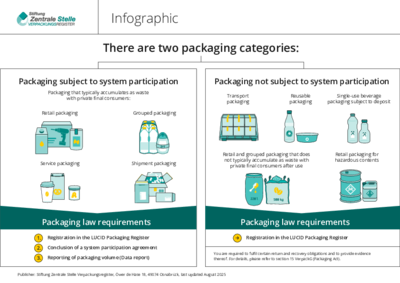What types of packaging are there? What are the statutory obligations that come with each of them?
Packaging law obligations of retail stores
Are you running a retail store, a market stall, a farm shop or a kiosk? Are you a direct seller or a pharmacist? Are you using packaging to hand over your goods to customers? If the answer is ‘yes’, then you are considered to be a producer under German packaging law. That means you have certain obligations to fulfil.
Obligations for packaging subject to system participation: registration, participation, reporting
Retail stores, market stalls, kiosks or pharmacies commonly hand over goods to their customers in retail or service packaging. This packaging typically accumulates as waste with private final consumers. That is why you must pay for that packaging's recycling. This is called 'system participation'. There are three things you need to do to fulfil all of your obligations under German packaging law:
Register with the LUCID Packaging Register.
Enter into a system participation agreement with a system operator. Please refer to this list for an overview of system operators .
You now have to regularly report your packaging volumes to both your system operator and the LUCID Packaging Register (data reporting).
What is ...
… service packaging?
is classified as retail packaging under the Verpackungsgesetz (Packaging Act). For packaging to qualify as service packaging, it has to be used to enable or support handing over goods to customers and it has to be filled right at the point of sale. Examples of service packaging include plastic bags and cans, paper bags, conical bags or cream jars. It even may be the customer themselves who fill the service packaging with goods at the point of sale, for example by filling a bowl with salad, pouring coffee into a takeaway cup or placing their purchases into a plastic or paper bag at checkout.
Heads-up: If you are only using service packaging to hand over your goods to customers, there is a special provision available to you: you can buy 'pre-participated' unfilled service packaging from a supplier or wholesaler. Further information can be found in our knowledge base dedicated to service packaging.
… retail packaging (such as pre-packaged sales units)?
is typically offered to private final consumers as a sales unit consisting of goods and packaging. Examples range from pre-packaged foodstuffs and textiles wrapped in foil to covers and boxes for technical devices.
Heads-up: If you are manufacturing, packaging and distributing your products yourself or if you are importing goods, you are required to check whether you bear responsibility for retail packaging as well. If this is the case, you are required to register with the LUCID Packaging Register, participate your packaging with a system and report your packaging volumes.
What you need to know
Shipment packaging such as shipping envelopes, boxes and bags or envelopes regardless of their material is almost always subject to system participation. You have three obligations to fulfil:
Register with the LUCID Packaging Register.
Enter into a system participation agreement with a system operator. Please refer to this list for an overview of system operators.
You now have to regularly report your packaging volumes to both your system operator and the LUCID Packaging Register (data reporting).
If you are using packaging such as plastic bags or paper cartons to deliver goods to customers, it is shipment packaging. Shipment packaging is retail packaging and is subject to system participation. You have three obligations to fulfil:
Register with the LUCID Packaging Register.
Enter into a system participation agreement with a system operator. Please refer to this list for an overview of system operators.
You now have to regularly report your packaging volumes to both your system operator and the LUCID Packaging Register (data reporting).
If you are procuring packaged goods directly from the manufacturer or via a wholesaler, you are required to verify that your business partner has complied with packaging law obligations. The public register of producers will you help you with this. If your business partners have not registered with the LUCID Packaging Register, the goods in question are automatically banned from distribution under German packaging law. In other words: you must not sell them.
Reusable packaging is not subject to system participation. If you are using reusable packaging, you are required to register with the LUCID Packaging Register. In the register, you have to indicate that you are using reusable packaging to hand over your products. The requirements for a reusables scheme are regulated by law. To learn more about the specific requirements for packaging to qualify as reusable, along with details about the obligations associated with reusable packaging, check our knowledge base dedicated to packaging types.
A level playing field is key if we want to protect our environment. Companies must ensure that their packaging harms the environment as little as possible. This is referred to as assuming 'producer responsibility', which governed by the Verpackungsgesetz (Packaging Act). Where packaging cannot be prevented, all market players that distribute packaged goods must be registered with the LUCID Packaging Register. Another factor is that 'high-quality' recycling of packaging waste is only possible in a financially sound market. That is why you are required to pay for the recycling of your retail, grouped or shipment packaging that is subject to system participation by concluding a 'system participation agreement' with a system operator.


